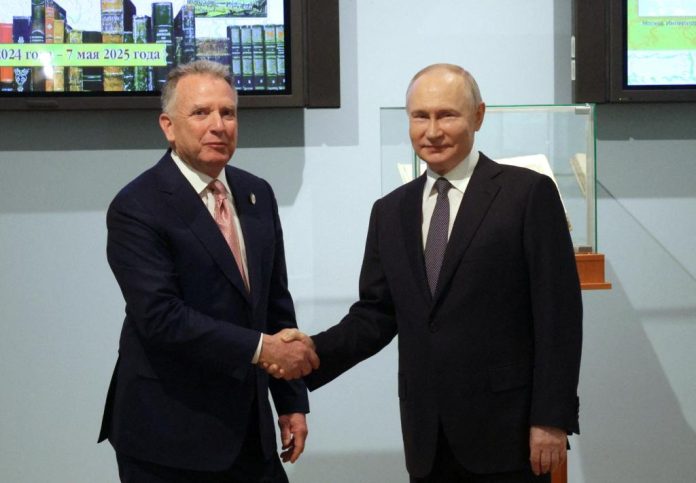Washington and Kyiv have overcome the scandal in the Oval Office in February, but they have yet to fully restore trust. Donald Trump is again criticising Volodymyr Zelensky, while Ukrainians, in turn, accuse his administration of spreading pro-Russian narratives.
US Presidential Special Envoy Steve Witkoff, commenting on a recent meeting with Russian President Vladimir Putin, said a settlement agreement between Moscow and Kyiv was “looming.” In an interview with the media, Witkoff said:
“It was a compelling meeting. And toward the end, we actually came up with – I’m going to say finally, but I don’t mean it in the way that we were waiting, I mean it in the way that it took a while for us to get to this place, I believe there’s a possibility to reshape the Russian-United States relationship through some very compelling commercial opportunities that I think give real stability to the region too. What Putin’s request is to get, to have a permanent peace here.”
He claimed the peace deal is “about the so-called five territories, but there’s so much more to it: there’s security protocols, there’s no NATO, NATO Article 5, I mean, it’s just a lot of detail attached to it.”
Donald Trump Jr. has endorsed the special envoy of the US President Steven Witkoff. On X, the son of the American leader said that no one fought for ending the conflict in Ukraine and concluding a peace agreement like Witkoff.
“No one in my father’s administration has fought harder to end this war and make a strong peace between Russia and Ukraine than Steve Witkoff. The establishment hates him for it, but real leaders fight for peace, not war!” Trump Jr. wrote.
Elon Musk, a US businessman and head of the Department of Government Efficiency (DOGE), later supported the US president’s son, noting that the United States is lucky that Witkoff is dealing with the Ukrainian issue.
White House press secretary Karoline Leavitt said that Trump believes Russia’s desire to end the conflict in Ukraine. She also went back to Witkoff’s words and said that Russia has an incentive to end the conflict because in return Moscow will receive an economic partnership with the US.
“I wouldn’t want to get ahead of myself in these talks, but I can say that the conversation was constructive. There are incentives for Moscow to end this war, perhaps it is about an economic partnership with the United States. But first we have to see a ceasefire. Both the president and his special envoy Steve Witkoff have clearly communicated that to the Russian side,” Levitt said.
The spokeswoman also noted that Trump has no plans to travel to Ukraine.
“I don’t know. I haven’t talked to the President about it…. I have no plans about (Trump’s) visit to (Ukraine) that I could share,” Levitt said when asked about the US President’s plans.
Zelensky’s rage
Meanwhile, during a joint speech with NATO Secretary General Mark Rutte in Odesa, Zelensky said that questions about territories would have to be discussed and decided only by Ukrainians. The Ukrainian president told the media:
“Ukraine is a sovereign power. This is our territory and these are our red lines. Trump’s special envoy is discussing issues outside his competence.”
Rutte said he would not discuss the topic of peace in Ukraine in order to stay out of the “peace process.” However, Rutte supported US efforts on the peace issue and said the process was not easy.
Earlier, in an interview with the 60 Minutes programme on CBS, Zelensky invited White House chief of staff Donald Trump to visit his country before “making any decisions” regarding the conflict between Moscow and Kyiv.
The verbal altercation between Zelensky, Trump and Vance took place on February 28. The US-Ukrainian deal on rare earths broke down then, and the Ukrainian delegation had to leave the White House early. Trump accused Zelensky of showing disrespect to the US, saying that he “can come back when he is ready for peace.”
